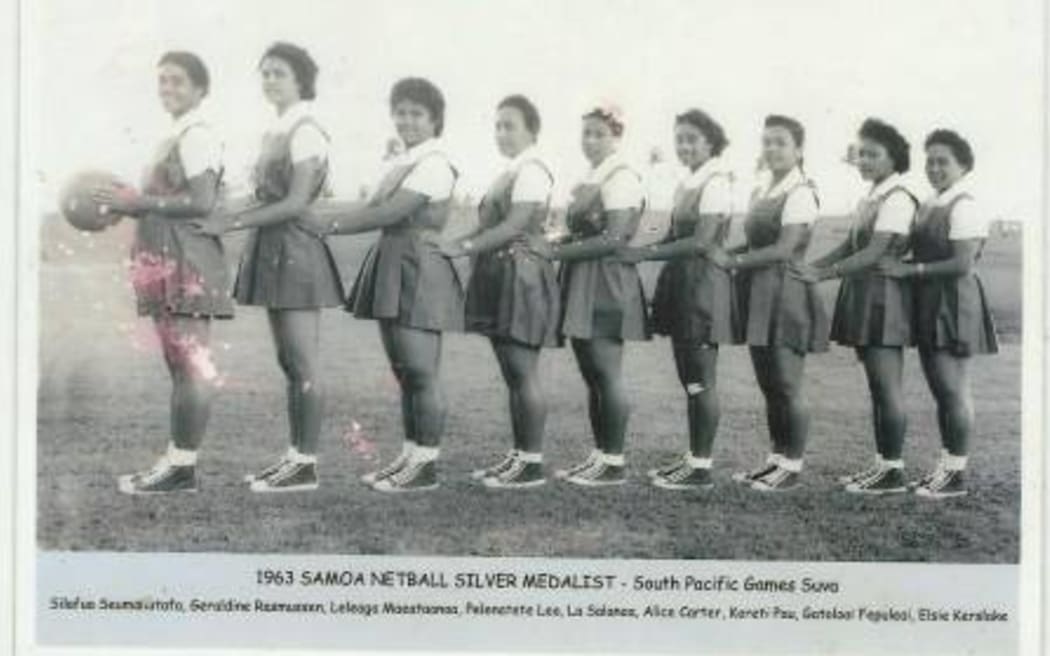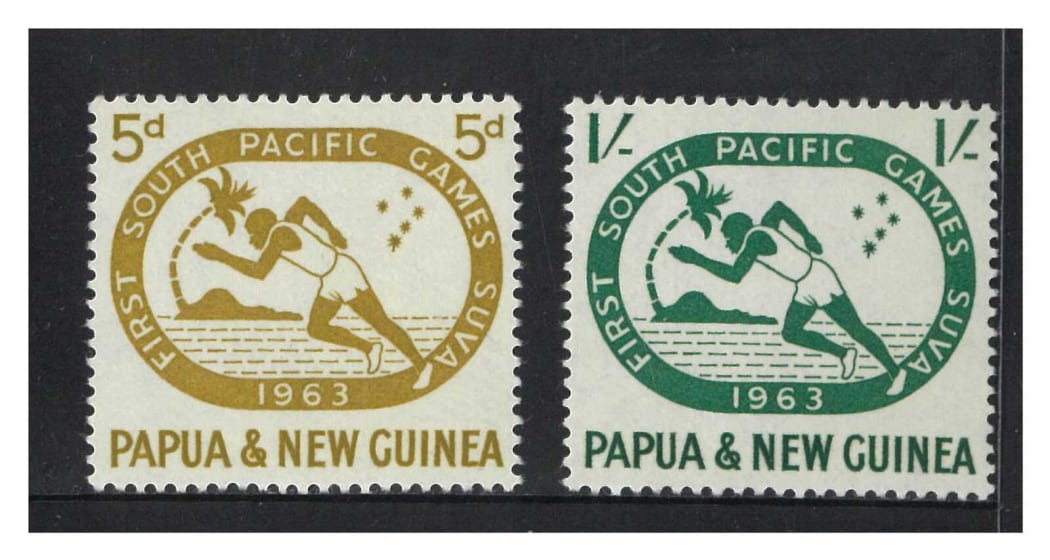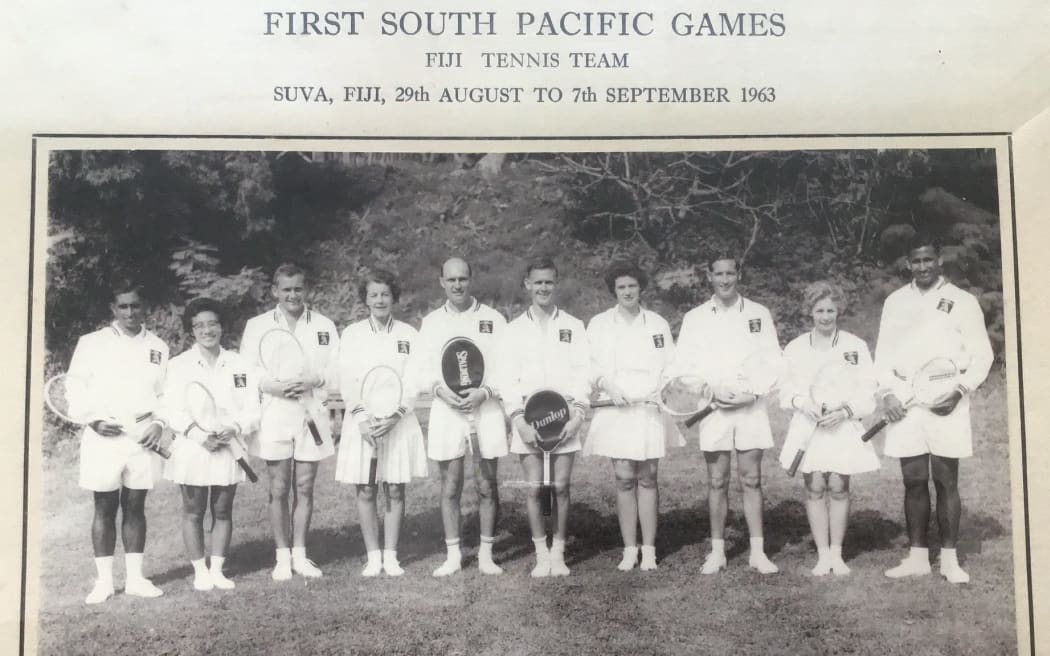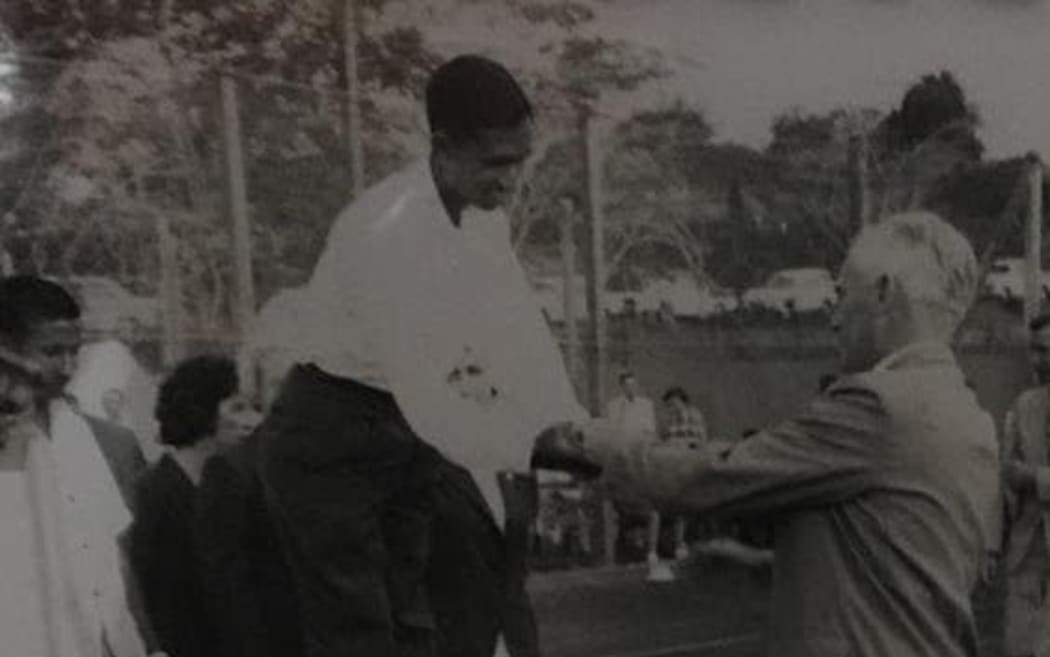
The Samoa netball team that took silver in 1963 Photo: Supplied
It all began with a toss of a ball and the smash of a tennis racquet.
The Cook Islands' Nono Tani's swift serve to her opponent at 9am on Thursday, August 29, 1963 thus kicked off the South Pacific Games in Suva.
Sixty years on the multi-sport event, now known as the Pacific Games, is a much-anticipated fixture, but with far more athletes and nations/territories competing than all those decades ago.
On that sunny morning, Mrs Tani and the Cook Islands won their mixed team game 8-0 against Western Samoa and would finish fourth, as Fiji took gold ahead of New Caledonia.
While the weather was typically tropical on the tennis courts that opening day, organisers had been concerned about the constant rain that had fallen on Suva in the run-up to the first day and affected some of the sports facilities.
The backroom planning
The idea of holding the South Pacific Games came through Dr Abdul Habib Sahu Khan, a Fijian representative at the meeting of the South Pacific Commission in 1959.
His idea was adopted and led to representatives of nine territories meeting in Noumea in March 1961 with the Fiji delegate, Mr L.O. Simpson, being appointed the first chairman.
It seemed logical, given its founding role, that Fiji would be offered the honour of staging the first South Pacific Games, and the country gratefully accepted.
The event was not only an opportunity to give sports people in the region a chance to improve by competing against fellow island rivals; it was established to create friendship and brotherhood among the Pacific.
An action plan moved quickly: during 1962, the South Pacific Commission founded the South Pacific Games Council to organise the Games.
Organisers sought out regional expertise in organising the games with the 1962 Empire Games in Perth, Australia the model for their smaller-scale regional version.
The main venue, Buckhurst Park, was upgraded with a new concrete stand, among the numerous upgrades it received.
However, the lack of finance and expertise caused concern in the lead-up to the Games with the lack of coordination of national sporting bodies and problems in communication creating problems for the organising committee.

Photo: Supplied
A significant step forward was appointing Englishman Francis Joseph Coyne, who had Olympic and Commonwealth games experience, as director in early 1963.
By late August organisers were confident they had everything in hand.
On the opening day a message was read out from Queen Elizabeth II wishing the Games the best.
"These Games are a new venture, and I am glad that they should first be held in a city of which my husband and I have such happy memories," she wrote.
"I join with the Government and people of Fiji in welcoming the representatives of the many countries which are taking part in the Games. I am sure that they will form new friendships which will strengthen the close and happy relations which exist between Fiji and her neighbours in the Pacific."
On the eve of the opening ceremony, it was noted by the AAP news agency, of "problems" over flags and anthems. Of the 13 teams there were only two independent nations - Tonga and Western Samoa. The others were British, French or American territories at the time.
That, the reporter said, would lead to La Marseillaise and God Save the Queen being regularly sung at medal ceremonies, accompanied by the flying of Union Jacks and Tricolours. The reporter did also note that the organisers had suggested that each territory bring along its own anthem and flag.
The Games start
Thirteen nations contested those inaugural Games - Papua New Guinea, British Solomon Islands, New Hebrides (now Vanuatu), Nauru, New Caledonia, Gilbert and Ellice Islands (now Kiribati), Fiji, Tonga, Western Samoa, American Samoa, Niue, the Cook Islands and French Polynesia.
A total of 646 athletes (516 men, 130 women) were sent along with 99 officials.
There was some logistical issues for some teams, with the Nauru squad of 16 athletes and two officials navigating a route involving boats and planes via Melbourne and Canberra to get to and from Suva.
The athletes competed for medals in nine sports - football, basketball, volleyball, swimming, athletics, rugby, boxing, tennis and table tennis.
There were some anomalies; for example, the men's basketball was held indoors, while the women's event was played on outdoor grass courts at Albert Park.
The official review of the Games noted boxing had some teething problems as "the standard varied tremendously and it was obvious that many of the competitors were not conversant with all the rules".
A dress rehearsal for the boxing was held in Suva Town Hall against an Australian University team. However, it was found that the venue was too small and a transit shed was made available on the wharf in which 1200 people could be seated. But still this was too small and on the final night several hundred fans were turned away.

The Fiji tennis team that took part and won gold in Suva Photo: Supplied
Buckhurst Park hosted both rugby and football matches.
There were some issues, notably, the dead ball area overlapped on to the athletics track and the drainage channel was seen as a potential danger to the players and had to be filled in temporarily for each match.
The rugby schedule was tight with six games held in just seven days. Two teams pulled out beforehand and the three teams - Fiji, Tonga and Samoa - played each other twice with the hosts winning all their matches to take the gold medal.
The football competition attracted six teams, with New Caledonia defeating Fiji 8-2 in the final.
The Suva Sea Baths, which held the swimming races, were filled direct from the sea without filtration.
"This lack of filtration makes it difficult, especially at the time of the year when prolonged rain washes mud into the estuary, to keep the pool filled with clear water. To get over this difficulty the suction pipe was extended out into the sea but in spite of that, there was difficulty in keeping the pool clean during the Games," the post-event review noted.
Fiji, as most host nations do, performed particularly well and comfortably topped the overall medals table, followed by New Caledonia and French Polynesia.
There were some notable performances, such as Fijian swimmer Carl Bay winning the largest number of individual medals with five golds in the pool. The Fiji women swimmers won every final.
Fiji shared the honours with PNG in the men's athletics. Fiji, led by Ana Ramacake in the sprints and jumps and Mere Turukawa in the field events, dominated the women's section.

Sir Keith Maddocks, Governor of Fiji, presents Rahim Zullah with his tennis gold medal at the first-ever pacific Games in 1963 Photo: Supplied
Lessons learned
Depending on someone's viewpoint, 'issues' at such an event can either be mere teething problems or a disaster.
Things could clearly have been different, but regardless the Papua New Guinea newspaper The Post Courier hailed the Games as a "huge success".
The Chairman of the South Pacific Games Organising Committee, J.H. Common, said they were held in a "satisfactory manner", though he harboured some reservations.
"The appointment of Fiji as first Host Territory was a considerable honour but as the two and a half years available for planning passed and the full impact of what had to be arranged was realised, the wish was sometimes expressed that the honour might have gone elsewhere.
"Nevertheless the challenge was accepted and everyone, or nearly everyone, the Government, associations, business houses and individuals, all responded to make the Games the success that they deserved to be," he said.
It was the start that was required, and over the years the Pacific Games has increased hugely in size and status.
The 1966 South Pacific Games, held in Noumea, New Caledonia, included three more sports, had one more participating territory, and had almost double the number of athletes, at 1200.
Now, about 5000 athletes can compete from more than 20 nations and territories.
This year's event takes place in Honiara, Solomon Islands from November 19 to December 2.


